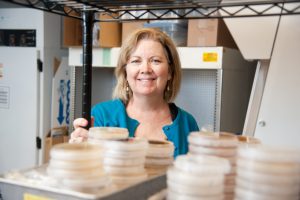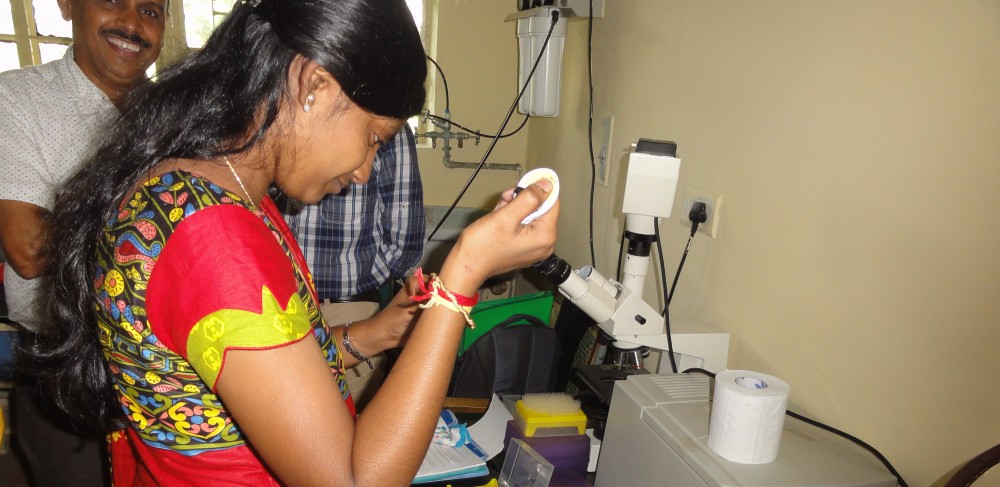As part of the Chancellor’s Faculty Excellence Program, NC State University has hired five outstanding faculty to form a new interdisciplinary faculty cluster on “Emerging Plant Disease and Global Food Security”. Understanding the dynamics of and managing emerging plant diseases requires a collaborative approach with expertise in epidemiology, population biology, microbial evolution, geospatial modeling and bioinformatics.
Mission: The faculty cluster will develop new knowledge to understand the fundamental basis of emerging diseases caused by pathogens of plants – including the development of tools – enabling a more rapid response to contain and limit potential damage by emerging threats. The cluster will study plant pathogens and their arthropod vectors that transmit them in nature, in agriculture, and post-harvest making linkages from genomes to ecosystem processes.
The cluster faculty expertise is in the areas of:
- Anna Whitfield: Director of the cluster. Integration of ecology, epidemiology, population genomics or host-microbe interactions from the molecular to population levels to investigate the biology of emerging plant disease agents, including potential vectors, that threaten local and global food security.
- Dorith Rotenberg: The overarching, long range goal of Dr. Rotenbergs research is to diminish plant virus disease epidemics by penetrating and mining new knowledge derived from insect vector and virus genomes to develop specific and durable “green biotechnological” breakthoughs to manage crop disease.
- Michael Bradshaw is a fungal biologist and works on powdery mildew fungi. He studies the systematics and population genetics of fungal pathogen populations.
- Qingshan Wei: Engineering next generation devices for real-time detection of plant pathogens or pests that vector them (e.g., isothermal nucleic acid amplification assays; ligand binding-based methods; novel biosensors, nanodevices; volatile detection apparatus, or three-dimensional goggles) and deploy sensors using robotic devices or unmanned aerial vehicles.
- David Rasmussen: Data science focused on conducting cross-cutting research in population genomics, epidemiology and the evolution of emerging crop pests and pathogens using molecular, bioinformatics, and evolutionary tools to track sources of disease outbreaks at multiple levels of scale
- Rob Scheller: Geospatial analytics for spatially-explicit prediction of transmission pathways and deploying rapid response strategies to detect and limit potential damage by emerging threats including approaches that leverage frontiers in citizen science, crowdsourcing with mobile technologies, and engaging stakeholders
Dr. Jean Ristaino is founding director of the Emerging Plant Disease and Global Food Security Cluster.  Dr. Ristaino works on the population genetics of historical epidemics of the pathogen that caused the Irish famine Phytophthora infestans and studies the population structure and epidemiology of modern day late blight outbreaks. Her lab is interested in the impact of migration, recombination and hybridization on the evolution of Phytophthora species. Her work has tracked migrations of P. infestans from its ancestral home in the Andes to the US and Europe. She developed pioneering research techniques for use of 150-year-old historic herbarium specimens to track epidemics (Ristaino, J. B et al, 2001 Nature, Saville et al., 2017, Plos One). She was also part of the team that sequenced the first genome of P. infestans (Hass et al, 2006, Science). Her recent work with collaborators has used next generation sequencing to study historical outbreaks (Martin et al, Nature Communications 2013). Her lab also manages the disease surveillance network called USABlight.org. This surveillance system records late blight outbreaks, sends disease alerts to growers, and provides decision support tools for managing disease. She also conducts Phytophthora and molecular diagnostics workshops globally in the developing world and has described new species of Phytophthora including Phytophthora andina and Phytophthora acaciae and has developed a Lucid-based taxonomic key. Dr. Ristaino was named a Jefferson Science Fellow with the US Department of State in 2012 and has worked on a range of emerging plant diseases that impact global food security with USAID. She serves on the advisory board of the Triangle Center for Evolutionary Medicine and the AgBioFEWS NRT. She has led the Triangle Global Food Security Initiative. She was awarded a Fulbright Research Scholar award in 2018 and conducted research at the University of Catania in Sicily. Dr. Ristaino’ research impacts the science of plant pathology, epidemiology, population genomics, food security and also impacts global science policy.
Dr. Ristaino works on the population genetics of historical epidemics of the pathogen that caused the Irish famine Phytophthora infestans and studies the population structure and epidemiology of modern day late blight outbreaks. Her lab is interested in the impact of migration, recombination and hybridization on the evolution of Phytophthora species. Her work has tracked migrations of P. infestans from its ancestral home in the Andes to the US and Europe. She developed pioneering research techniques for use of 150-year-old historic herbarium specimens to track epidemics (Ristaino, J. B et al, 2001 Nature, Saville et al., 2017, Plos One). She was also part of the team that sequenced the first genome of P. infestans (Hass et al, 2006, Science). Her recent work with collaborators has used next generation sequencing to study historical outbreaks (Martin et al, Nature Communications 2013). Her lab also manages the disease surveillance network called USABlight.org. This surveillance system records late blight outbreaks, sends disease alerts to growers, and provides decision support tools for managing disease. She also conducts Phytophthora and molecular diagnostics workshops globally in the developing world and has described new species of Phytophthora including Phytophthora andina and Phytophthora acaciae and has developed a Lucid-based taxonomic key. Dr. Ristaino was named a Jefferson Science Fellow with the US Department of State in 2012 and has worked on a range of emerging plant diseases that impact global food security with USAID. She serves on the advisory board of the Triangle Center for Evolutionary Medicine and the AgBioFEWS NRT. She has led the Triangle Global Food Security Initiative. She was awarded a Fulbright Research Scholar award in 2018 and conducted research at the University of Catania in Sicily. Dr. Ristaino’ research impacts the science of plant pathology, epidemiology, population genomics, food security and also impacts global science policy.

